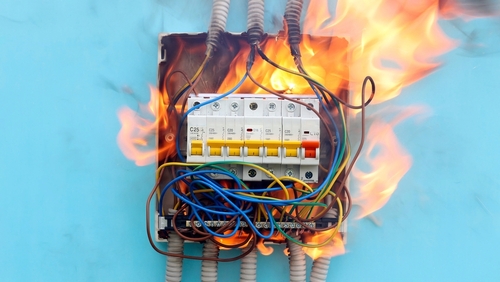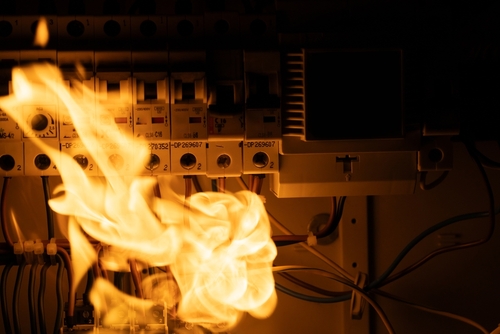July 2, 2025
Arc Fault Protection: How AFCI Breakers Help Prevent Electrical Fires in Your Home

Ever wondered why your breaker trips for no clear reason? Chances are, you’re experiencing an electrical issue without really knowing it. That tripped breaker is actually a good thing, because it’s protecting you from something dangerous: an arc fault.
One of the most important tools in modern home safety is the AFCI breaker—also known as an arc fault circuit breaker—which functions to prevent electrical fires. At Applewood, we aim to help you understand and prevent hidden electrical hazards whether you choose us as your electrician or not. We’ll break down what arc fault protection is, why it matters, and how to make sure your home is up to code and safe from electrical fires.
What Is an Arc Fault?
An arc fault happens when electricity jumps—or arcs—through a damaged or loose connection in your wiring. This creates heat, which can ignite wood, insulation, or dust without tripping a standard breaker.
Most faults are caused by:
- Worn or frayed wires
- Loose connections behind outlets or switches
- Damaged cords
- Overloaded circuits
Arc faults are harder to detect than traditional short circuits, and they’re more likely to cause electrical fires if they’re not stopped.

What Is an AFCI Breaker?
An arc fault circuit interrupter, or AFCI, is a breaker that’s specially designed to detect arcing conditions. AFCIs have many names—AFCI circuit breakers and arc fault breakers, to name a few—but they all function the same way. No matter what you call it, it’s an important tool for home safety and preventing electrical fires.
How Does Arc Fault Protection Work?
AFCI breakers monitor the flow of electricity and sense irregular patterns, like a spark or arc, and immediately shut off power to the circuit. Modern combination arc fault circuit breakers offer the most comprehensive protection by using algorithms and sensors to detect a wider range of arc fault conditions. This level of smart monitoring goes beyond what traditional breakers or fuses can do—and it’s often the only way to stop a fire before it starts.
AFCI vs GFCI: What’s the Difference?
A GFCI, or ground fault circuit interrupter, is another tool guarding against wiring hazards. GFCIs and AFCIs both enhance electrical safety, but they protect against different dangers: GFCIs guard against electric shock, while AFCIs prevent electrical fires caused by arc faults.
While an AFCI detects arcing, or sparking, in your wiring, GFCIs protect against shock hazards near water. GFCI outlets are more common because they’ve been part of National Electrical Code (NEC) since the 1970s, and they’re commonly installed by homeowners themselves. AFCIs, on the other hand, were introduced in 1999 and are now required in most areas of the home. Since they live in the panel, they’re not as visible as GFCI outlets, so many homeowners aren’t even aware they have one.
Homes built after 2014 often use combination AFCI/GFCI breakers, especially in kitchens, bathrooms, laundry rooms, or other places where both wiring and water are present.
Why Arc Fault Protection Matters
According to the National Fire Protection Association (NFPA), electrical failures or malfunctions cause over one in ten home structure fires in the U.S. each year. You can significantly reduce your risk of an electrical fire by installing AFCI protection and regularly monitoring your electrical system.
AFCI breakers are especially important in these homes:
- Built before 2000, when AFCI requirements were adopted
- With aging electrical systems
- With children or pets that may damage cords
- Undergoing remodeling or adding appliances
Where Is Arc Fault Protection Required?
The NEC requires AFCI breakers in most rooms, including:
- Bedrooms
- Living rooms
- Dining rooms
- Hallways
- Laundry areas
NEC code is updated often, so keep an eye out for new regulations and additional rooms that need AFCI breakers. If you’re unsure whether your home meets NEC arc fault requirements, our Applewood licensed electricians can perform a quick inspection and let you know where upgrades are needed.
Should I Upgrade My Electrical Panel?

If you own an older home or you’re experiencing electrical issues, it may be time to replace your electrical panel.
Signs you need AFCI breakers include:
- Breakers that trip randomly or without obvious cause
- Older wiring or panels
- Recently added appliances
- Outdated two-prong outlets or wet areas without GFCI protection
- A recent remodel
Applewood’s expert licensed electricians can examine your current panel and walk you through your options, like installing AFCI receptacles or upgrading to a full panel with AFCI breakers. Schedule your service today!
Get Professional Arc Fault Protection with Applewood
At Applewood, we’ve helped thousands of Denver/Boulder-area homeowners keep their homes safe, comfortable, and up to code. If you’re unsure about your home’s arc fault protection or have questions about AFCI vs GFCI, we’re here to help.
Our licensed, on-time electricians are ready to inspect your panel and recommend the best solution—without overtime charges and with our Code of Ethics.
Schedule an electrical safety inspection today or call us to learn more.
Frequently Asked Questions
Do all circuits need AFCI protection?
Yes, especially in living spaces. AFCI breakers or GFCI outlets are required by code in most Denver area building codes. Arc fault protection requirements prevent electrical fires and improve your home’s safety.
Can I install an AFCI myself?
Technically, yes, but it’s not recommended unless you’re a licensed electrician. Improper installation can pose a safety risk and defeat the purpose of the protection.
What’s the difference between AFCI outlets and breakers?
Both provide arc fault protection, but AFCI breakers protect the entire circuit, while AFCI receptacles only protect downstream outlets. A licensed Applewood electrician can help you decide which is best for your home.


